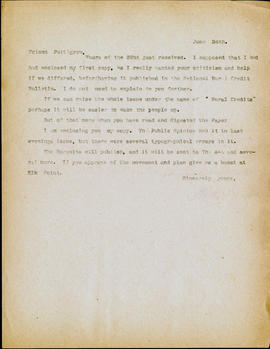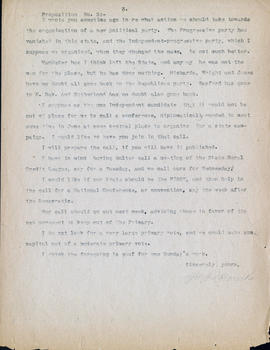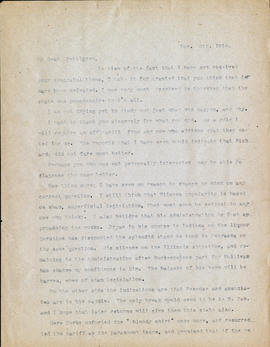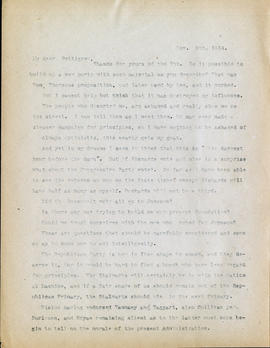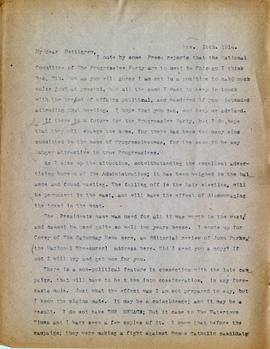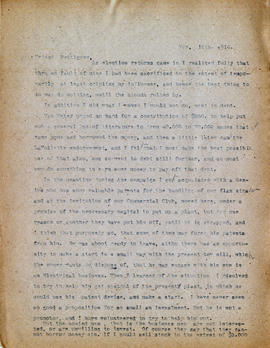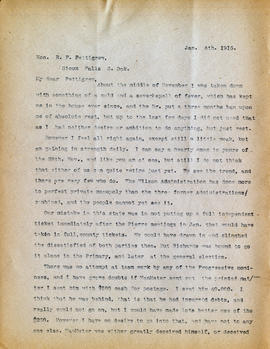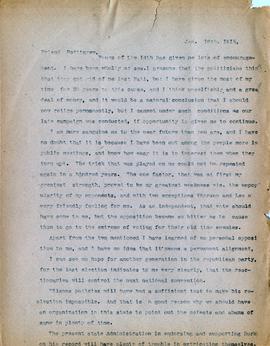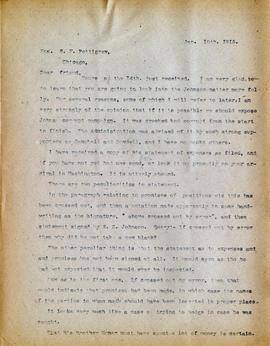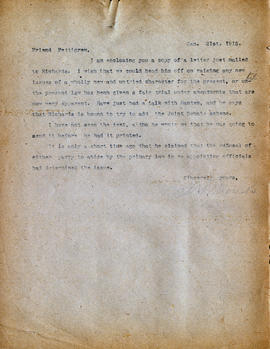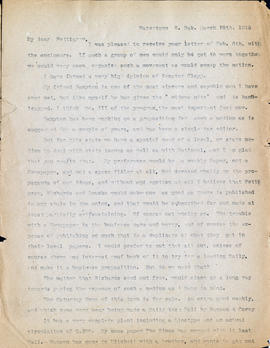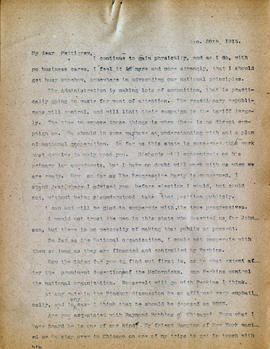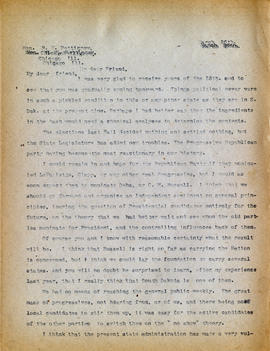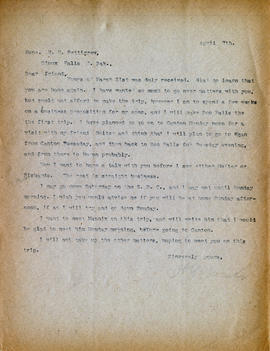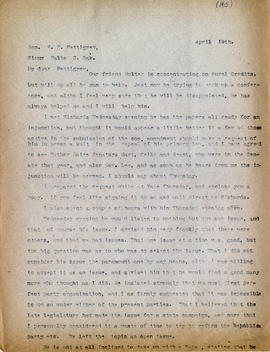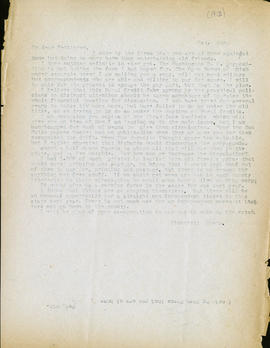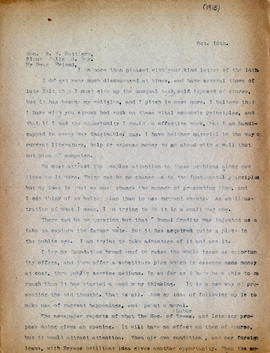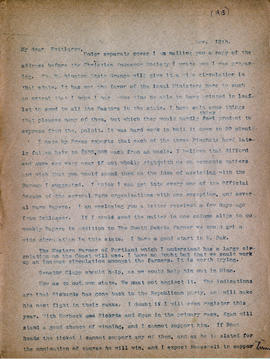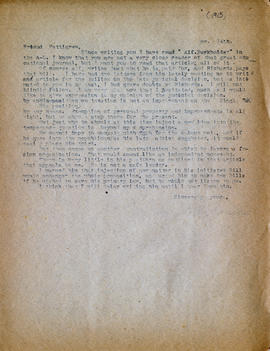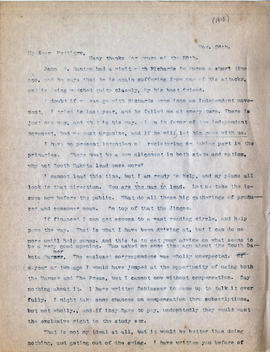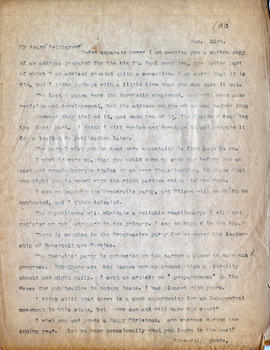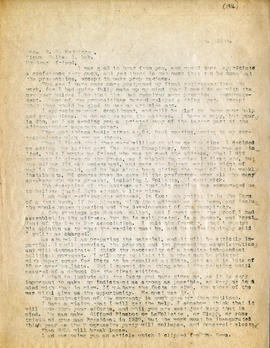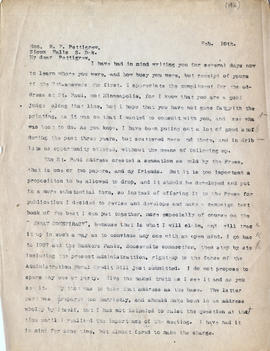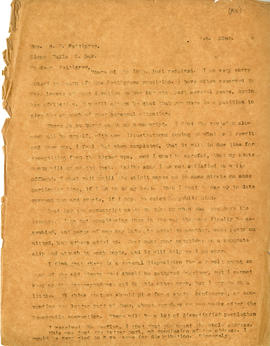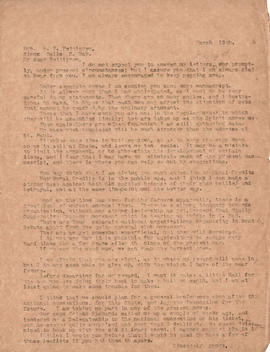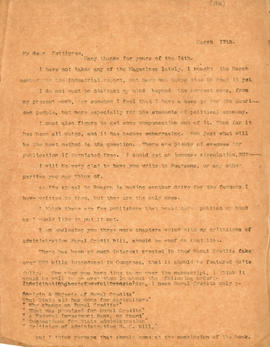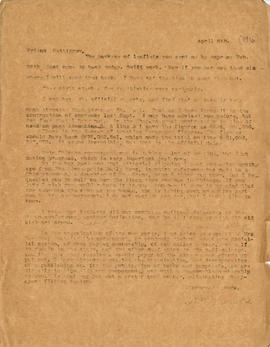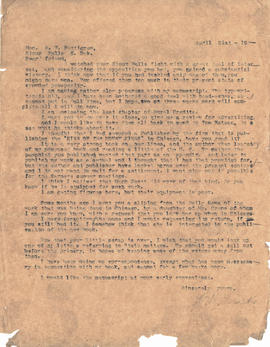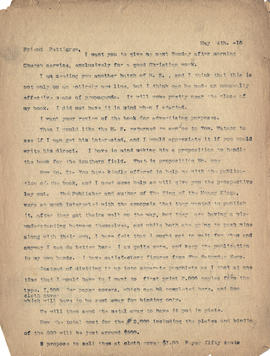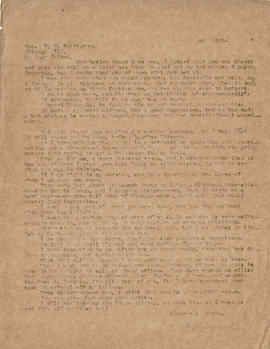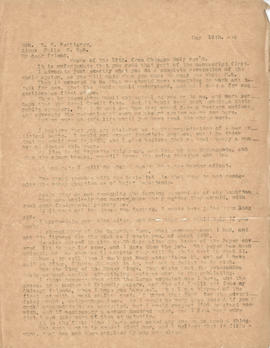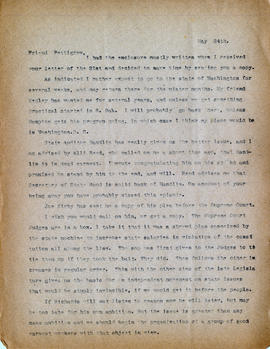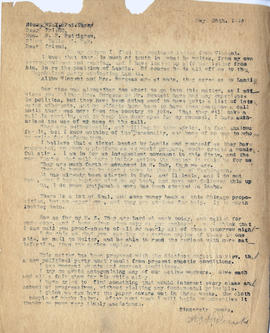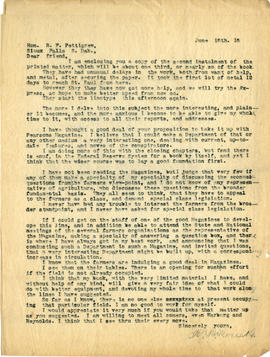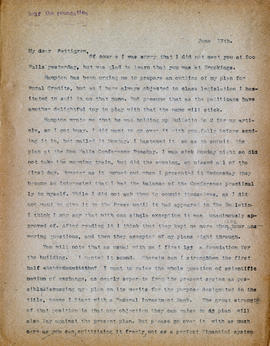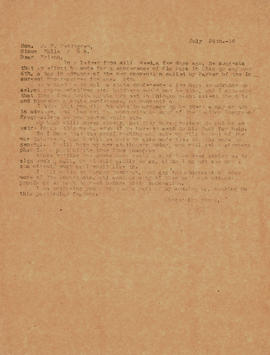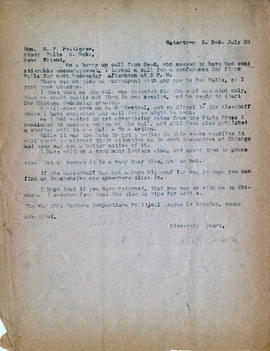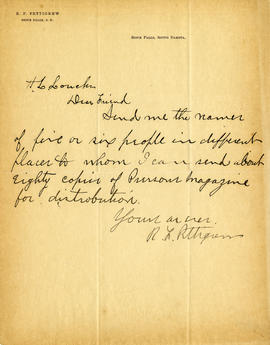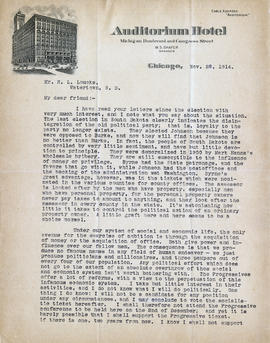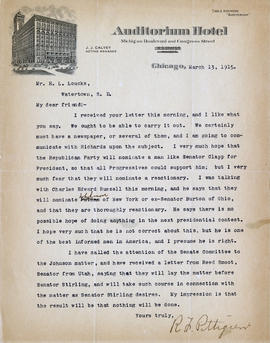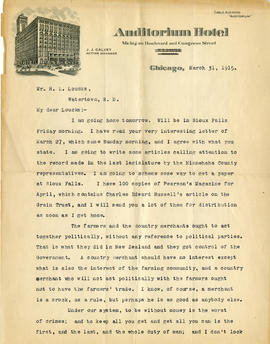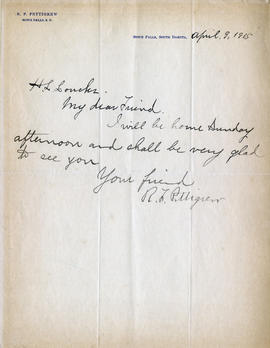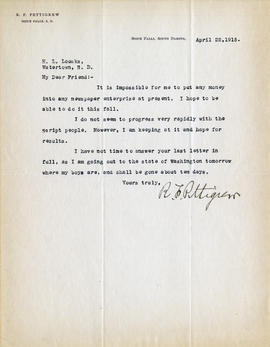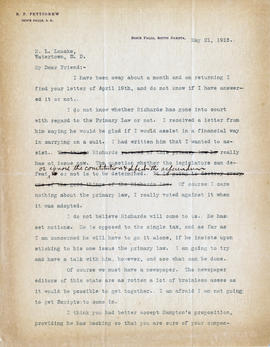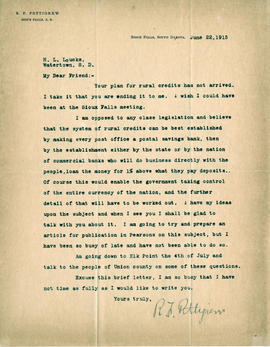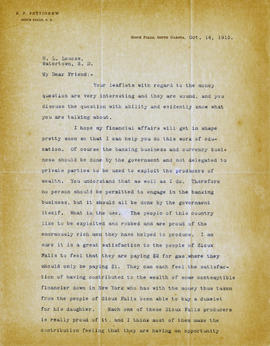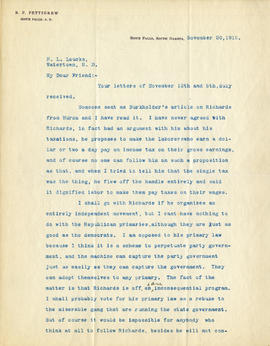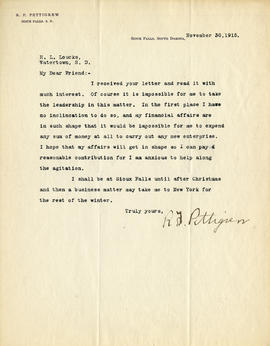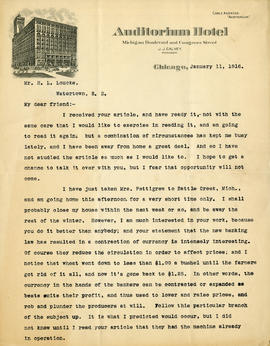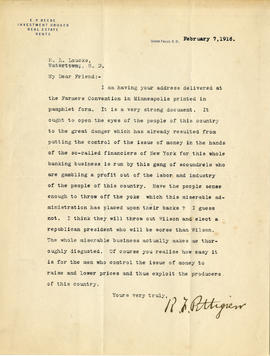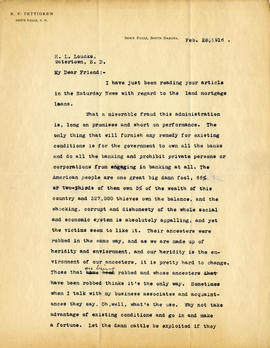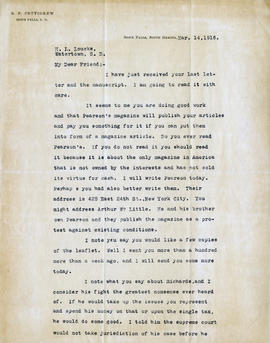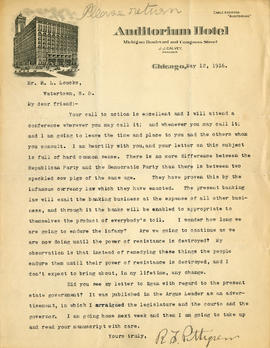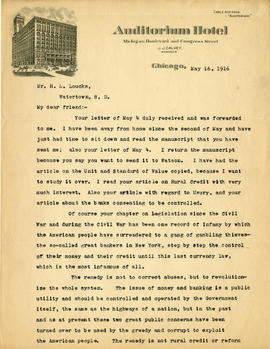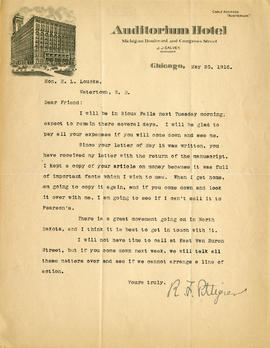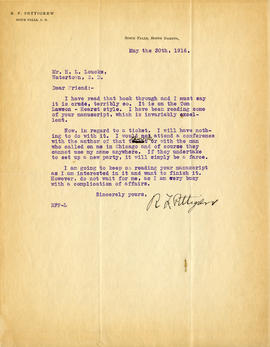Identity elements
Reference code
Name and location of repository
Level of description
Collection
Title
H.L. Loucks Correspondence with R. F. Pettigrew
Date(s)
- 1914-1916 (Accumulation)
Extent
0.42 linear feet (1 document case)
Name of creator
Biographical history
Henry Langford Loucks was born at Hull, Ontario, Canada, May 24, 1846 to William J. and Anna (York) Loucks. He was educated in the Canadian common schools. He married Florence Isabel McCraney at Oakville, Ontario, Canada, May 22, 1878. They had seven children, four of whom grew to maturity: Perry, Anna, Elizabeth, and Daniel. Loucks came to the United States and conducted a mercantile business in Michigan and later in Missouri. In 1884, he settled on a government homestead in Deuel County, Dakota Territory, near Clear Lake (S.D.). His settlement came as the great boom was subsiding. He experienced almost at once the hardships which were common to the farmers of the region and he took up their cause by organizing a "farmer's club" which soon became the Territorial Alliance. In 1885, this group affiliated with the National Farmer's Alliance. Loucks became the leader and president of the Territorial Alliance and assisted in organizing a number of cooperative business ventures, including fire and hail insurance and merchandising. He also established the Dakota Ruralist as the exponent of his economic views and published it for nearly twenty years. / At first, he and his associates, who generally affiliated with the Republican Party, hoped to accomplish their objectives through the existing parties. But in 1890, at a joint convention of the Knights of Labor and the state Farmers' Alliance, of which he was then president, Loucks was named as candidate for governor. He was defeated, but succeeded in consolidating a large section of the farmers into a separate political party in 1891, at first known as the Independent, later identified with the Peoples of Populist Party. In 1892, he presided over the first Populist Party national convention. In the same year he was elected president of the National Farmers' Alliance and Industrial Union. He fought for the adoption of the initiative and referendum in South Dakota in 1898 and its success was conceded to have resulted from his efforts. / Loucks published several works, the titles of which indicate the direction of this thought. Some of the titles include: The New Monetary System (1893); Government Ownership of Railroad and Telegraphs (1894); and the Great Conspiracy of the House of Morgan and How to Defeat It (1916). / While his home for many years was Watertown, South Dakota, his death occurred at Clear Lake, South Dakota, December 29, 1928.
Name of creator
Biographical history
Richard F. Pettigrew was a Delegate from the Territory of Dakota and a Senator from South Dakota. Born in Ludlow, Windsor County, Vt., July 23, 1848, he moved with his parents to Wisconsin in 1854. He attended the public schools and Evansville Academy, Evansville, Wis. and entered Beloit College, Beloit, Wis., in 1864. He spent one year teaching school and studying law in Iowa and entered the law department of the University of Wisconsin at Madison in 1867. / He went to Dakota in 1869 in the employ of a United States deputy surveyor. He settled in Sioux Falls and was admitted to the bar about 1871. Pettigrew practiced law, and engaged in surveying and the real estate business. / He was a member of the Territorial House of Representatives 1872 and served in the Territorial council 1877 and 1879. He was elected as a Republican Delegate to the Forty-seventh Congress (March 4, 1881-March 3, 1883). He was an unsuccessful candidate for reelection in 1882 to the Forty-eighth Congress. He was a member of the Territorial council 1885. / Upon the admission of South Dakota as a State into the Union was elected as a Republican to the United States Senate in 1889 and reelected in 1895 and served from November 2, 1889, to March 3, 1901. / Pettigrew left the Republican Party on June 17, 1896, to join the Silver Republicans. He was an unsuccessful candidate for reelection in 1900. He served as chairman of the Committee on Indian Affairs (Fifty-fourth and Fifty-fifth Congresses). / He engaged in the practice of law in New York City and returned to Sioux Falls where he was active in politics and business until his death in that city October 5, 1926.
Content and structure elements
Scope and content
Composed of correspondence between Henry Langford Loucks and Richard F. Pettigrew during the years 1914-1916. The content of the letters is mainly political in nature, dealing with issues of the progressive movement in the United States in the early 1900's. The collection also contains photographs, and published editorials and a pamphlet written by Loucks.
System of arrangement
Conditions of access and use elements
Conditions governing access
This collection is open to researchers without restrictions. The materials in the Archives do not circulate and may be used in-house only.
Researchers conducting extensive research are asked to make an advance appointment to access archival material. Please call or e-mail prior to visiting the collection and indicate as much detail as possible about a particular topic and intended use.
Physical access
Technical access
Conditions governing reproduction
South Dakota State University supports access to the materials, published and unpublished, in its collections. Nonetheless, access to some items may be restricted as a result of their fragile condition or by contractual agreements with donors.
Languages of the material
- English
Scripts of the material
Language and script notes
Finding aids
Acquisition and appraisal elements
Custodial history
Immediate source of acquisition
Appraisal, destruction and scheduling information
Accruals
Related materials elements
Existence and location of originals
Existence and location of copies
Related archival materials
Addresses
[Watertown? S.D. : s.n., between 1910 and 1930].
Call number: SD Collection: S561.5 .L68
Government ownership of railroads and telegraph, as advocated by the National Farmers' Alliance and industrial union
Huron, S.D.: s.n., 1893.
Call number: Books/Upper Level: HE1081.L6
The great conspiracy of the house of Morgan and how to defeat it
[Watertown, S.D.: H. L. Loucks] c1916.
Call number: Books/Upper Level: HG2481.L6g
The great conspiracy of the house of Morgan exposed and how to defeat it
[Watertown, S.D.: The Author], c1916.
Call number: Books/Upper Level: HG2481.L6g2
How to restore and maintain our government bonds at par
[Watertown, S.D.: The Author], c1921.
Call number: Books/Upper Level: HJ8117.L84
The mythical gold base: or, Standard of the Federal Reserve System compared with our farmers land loan and sub-treasury plan
[Watertown, S.D: American Honest Money League, 1922].
Call number: SD Collection: HG2565.L6
The new monetary system as advocated by the National Farmers' Alliance and Industrial Union
[Aberdeen, S.D.], Ruralist Quarterly, 1895.
Call number: Books/Upper Level: HG529.L6 1895
"Our daily bread" must be freed from the greed of private monopoly
[Watertown, S.D.: The Author] c1919.
Call number: Books/Upper Level: HD9036.L7


